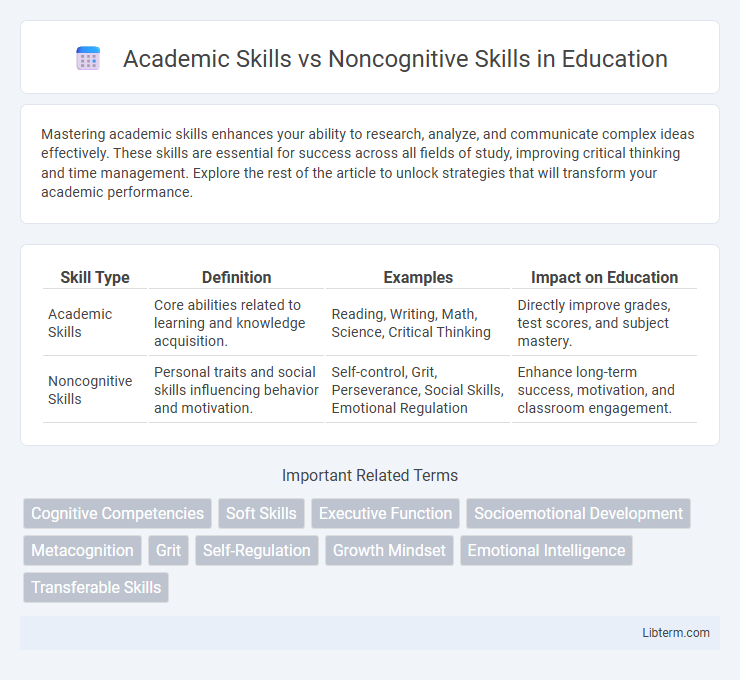Mastering academic skills enhances your ability to research, analyze, and communicate complex ideas effectively. These skills are essential for success across all fields of study, improving critical thinking and time management. Explore the rest of the article to unlock strategies that will transform your academic performance.
Table of Comparison
| Skill Type | Definition | Examples | Impact on Education |
|---|---|---|---|
| Academic Skills | Core abilities related to learning and knowledge acquisition. | Reading, Writing, Math, Science, Critical Thinking | Directly improve grades, test scores, and subject mastery. |
| Noncognitive Skills | Personal traits and social skills influencing behavior and motivation. | Self-control, Grit, Perseverance, Social Skills, Emotional Regulation | Enhance long-term success, motivation, and classroom engagement. |
Introduction to Academic and Noncognitive Skills
Academic skills encompass literacy, numeracy, and critical thinking, essential for understanding and applying knowledge across subjects. Noncognitive skills include traits such as perseverance, motivation, and emotional regulation, which influence learning, behavior, and social interactions. Both skill types contribute significantly to academic success and overall personal development.
Defining Academic Skills
Academic skills encompass the foundational abilities required for effective learning, including reading comprehension, writing proficiency, mathematical reasoning, and critical thinking. These skills are essential for mastering subject-specific content and achieving measurable academic success. Unlike noncognitive skills, which involve traits such as motivation and perseverance, academic skills focus primarily on cognitive processes that directly impact educational performance.
Defining Noncognitive Skills
Noncognitive skills encompass traits such as perseverance, self-regulation, social skills, and emotional intelligence, which significantly influence academic success and life outcomes. Unlike academic skills that involve cognitive abilities and knowledge acquisition, noncognitive skills shape motivation, behavior, and interpersonal interactions. Research shows that these skills are critical for problem-solving, goal-setting, and adapting to challenges beyond traditional academic performance.
Key Differences Between Academic and Noncognitive Skills
Academic skills primarily involve cognitive abilities such as reading, writing, mathematics, and subject-specific knowledge critical for academic success and standardized assessments. Noncognitive skills encompass traits like perseverance, self-regulation, social-emotional learning, motivation, and interpersonal skills, which influence behavior, attitude, and resilience in learning environments. The key differences lie in academic skills' focus on intellectual aptitude and content mastery, while noncognitive skills emphasize emotional intelligence and character development essential for long-term achievement beyond academics.
The Role of Academic Skills in Student Success
Academic skills such as reading comprehension, mathematical reasoning, and critical thinking are fundamental predictors of student success, directly influencing academic performance and long-term educational attainment. Mastery of these skills enables effective knowledge acquisition and problem-solving, which are essential for navigating complex curricula and standardized assessments. Research consistently shows that students with strong academic skills demonstrate higher graduation rates and improved career opportunities compared to those lacking in these competencies.
The Impact of Noncognitive Skills on Learning Outcomes
Noncognitive skills, such as perseverance, self-control, and motivation, significantly influence student learning outcomes by enhancing engagement and resilience in academic settings. Research demonstrates that these skills contribute to better classroom behavior, higher grades, and increased graduation rates beyond the effects of traditional academic skills. Educational interventions that foster noncognitive skills lead to improved long-term success by supporting emotional regulation and social interaction critical for effective learning.
Measuring Academic Versus Noncognitive Skills
Measuring academic skills typically involves standardized tests assessing knowledge in subjects like math, reading, and science, providing quantifiable data on student performance. Noncognitive skills measurement includes surveys, behavioral observations, and self-assessments evaluating traits such as motivation, perseverance, and social-emotional abilities. Both skill types contribute to student success, but noncognitive skills require qualitative and longitudinal approaches due to their subjective and developmental nature.
Integrating Both Skill Sets in Education
Integrating academic skills and noncognitive skills in education enhances student success by combining cognitive abilities such as literacy and numeracy with soft skills like perseverance, self-regulation, and social-emotional learning. Research from the OECD and CASEL highlights that students with strong noncognitive skills tend to achieve higher academic performance and improved long-term outcomes. Educational frameworks that embed project-based learning, collaborative activities, and mindfulness practices foster the seamless development of both skill sets, preparing learners for complex real-world challenges.
Challenges in Developing Noncognitive Skills
Developing noncognitive skills such as resilience, self-control, and social competence faces challenges including insufficient assessment tools, cultural differences in value emphasis, and limited integration in traditional educational curricula centered around academic skills like literacy and numeracy. These challenges hinder consistent measurement and support, making it difficult for educators to tailor interventions that effectively foster emotional intelligence and interpersonal abilities alongside cognitive learning. Overcoming these obstacles requires multidisciplinary approaches and policy shifts to elevate the importance of noncognitive skill development within education systems.
Future Trends: Balancing Academic and Noncognitive Skills in Education
Future trends in education emphasize a balanced development of academic skills such as literacy, numeracy, and critical thinking alongside noncognitive skills like emotional intelligence, resilience, and adaptability. Integrating social-emotional learning (SEL) programs and personalized learning technologies enhances student engagement and prepares learners for complex, dynamic workplaces. Data-driven approaches combining cognitive and noncognitive assessments offer more holistic insights into student potential and long-term success.
Academic Skills Infographic

 libterm.com
libterm.com